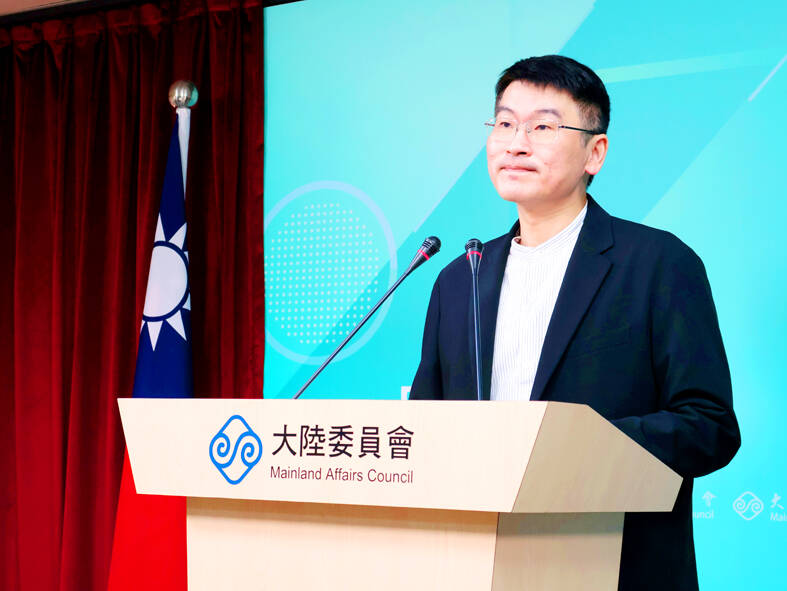The travel alert for China would remain “orange,” even though China has been declared a “hostile foreign force,” the Mainland Affairs Council told reporters in Taipei yesterday.
The council was asked whether there would be any change in the travel alert after President William Lai (賴清德) said Beijing’s increasing infiltration efforts against Taiwan has made it a “hostile foreign force” as defined by the Anti-infiltration Act (反滲透法).
“We raised the travel alert to orange, because Beijing has been attempting to destroy the Republic of China and has intimated Taiwanese by detaining and arresting them without following due process and implementing 22 guidelines that allow its courts to try in absentia and sentence to death so-called ‘diehard’ Taiwanese independence activists,” Mainland Affairs Council Deputy Minister and spokesperson Liang Wen-chieh (梁文傑) told a news conference.

Photo: CNA
“We had already taken political factors into consideration when adjusting the travel alert, which would remain orange for now. We did not see the necessity to further raise the travel alert to red,” he said.
Some tourism operators have expressed concern that people would soon be asked to register their trips to China with the government, as stated by the president in his speech last week, saying the requirement would dampen interest in visiting China and consequently affect their business.
In response, Liang said that the registration is intended as a safety measure.
“We have been clear all along that the registration for travelers to China is not mandatory and would not be used to control their whereabouts. Rather, it is to let travelers know ways to seek assistance in emergency situations,” he said.
Liang was also asked whether the government should consider raising travel alerts to certain countries that have close relations with China and might collude with Beijing to extradite Taiwanese independence advocates to China.
He said that the council has yet to see countries extradite people to China on charges of secession.
“We have examined extradition treaties China signed with 60 countries. A person is not likely to be extradited unless their action is deemed a crime in both countries. China is perhaps one of the few countries that consider secession a crime, but we do not exclude the possibility that certain countries might be very cooperative with China on this matter. We will ask Taiwanese travelers to be particularly cautious when traveling in these countries, but so far we have not seen any such cases,” he said.
On the Ministry of Education’s suggestion that students in primary and junior-high schools avoid participating in cross-strait exchanges, Liang said that China has indeed switched its focus to influencing Taiwan’s next generation.
“From our perspective, we would not issue a comprehensive ban on cross-strait exchange activities for primary and junior-high students. However, we hope that such activities would be depoliticized and secure unanimous approval from parents’ associations, rather than an unilateral decision from the school staff and faculty,” he said.

DEFENSE: The National Security Bureau promised to expand communication and intelligence cooperation with global partners and enhance its strategic analytical skills China has not only increased military exercises and “gray zone” tactics against Taiwan this year, but also continues to recruit military personnel for espionage, the National Security Bureau (NSB) said yesterday in a report to the Legislative Yuan. The bureau submitted the report ahead of NSB Director-General Tsai Ming-yen’s (蔡明彥) appearance before the Foreign and National Defense Committee today. Last year, the Chinese People’s Liberation Army (PLA) conducted “Joint Sword-2024A and B” military exercises targeting Taiwan and carried out 40 combat readiness patrols, the bureau said. In addition, Chinese military aircraft entered Taiwan’s airspace 3,070 times last year, up about

A magnitude 4.3 earthquake struck eastern Taiwan's Hualien County at 8:31am today, according to the Central Weather Administration (CWA). The epicenter of the temblor was located in Hualien County, about 70.3 kilometers south southwest of Hualien County Hall, at a depth of 23.2km, according to the administration. There were no immediate reports of damage resulting from the quake. The earthquake's intensity, which gauges the actual effect of a temblor, was highest in Taitung County, where it measured 3 on Taiwan's 7-tier intensity scale. The quake also measured an intensity of 2 in Hualien and Nantou counties, the CWA said.

The Overseas Community Affairs Council (OCAC) yesterday announced a fundraising campaign to support survivors of the magnitude 7.7 earthquake that struck Myanmar on March 28, with two prayer events scheduled in Taipei and Taichung later this week. “While initial rescue operations have concluded [in Myanmar], many survivors are now facing increasingly difficult living conditions,” OCAC Minister Hsu Chia-ching (徐佳青) told a news conference in Taipei. The fundraising campaign, which runs through May 31, is focused on supporting the reconstruction of damaged overseas compatriot schools, assisting students from Myanmar in Taiwan, and providing essential items, such as drinking water, food and medical supplies,

New Party Deputy Secretary-General You Chih-pin (游智彬) this morning went to the National Immigration Agency (NIA) to “turn himself in” after being notified that he had failed to provide proof of having renounced his Chinese household registration. He was one of more than 10,000 naturalized Taiwanese citizens from China who were informed by the NIA that their Taiwanese citizenship might be revoked if they fail to provide the proof in three months, people familiar with the matter said. You said he has proof that he had renounced his Chinese household registration and demanded the NIA provide proof that he still had Chinese